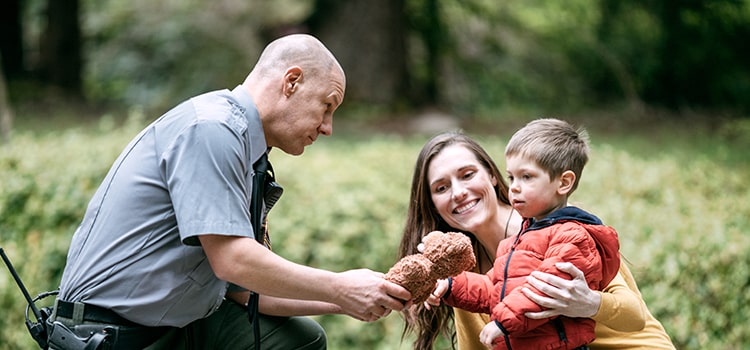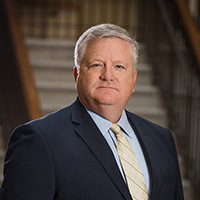In this Article
A Guide to U.S. Police Ranks in Order

All law enforcement organizations have a chain of command with levels of authority that resemble military ranks. The specific titles and duties can vary from one police department to another, but in general, the rankings follow this order, from uniformed officer to highest in command:
Some police departments have steps between major ranks, such as corporal or master sergeant. At any rank, you may have the opportunity to be assigned to special investigative units, beats, or specialized police department careers.
Training and education requirements for entry-level police officers differ depending on the organization. Some accept candidates with a high school diploma or with military service. However, many departments require applicants to have a minimum of an associate’s degree. Upper ranks usually require a bachelor’s degree.
Police Officer
Police officers make up the majority of sworn officers in any police department. They are on the front lines of enforcing local laws and maintaining a safe community. On any day, a police officer will perform duties ranging from writing tickets and completing routine paperwork to responding to threats and emergencies.
Many police departments assign officers to beats. These beats may be geographically-based, such as patrolling an area of a city, or they may be determined by mode of patrol, such as car, bicycle, or motorcycle. Specialized beats can include working on a K-9 unit, bomb squad, or burglary/theft division.
New hires complete a probationary period during which they receive on-the-job training.
Police Officer Responsibilities
- Patrol designated areas
- Respond to calls from citizens
- Write traffic tickets and issue citations
- Assist at the scene of an accident
- Serve warrants for search or arrest
- Arrest people suspected of crimes
- Interview witnesses or suspects
- Assist with crime investigation or surveillance
- Prepare reports
- Testify in court
Detective
Detectives investigate crimes and criminal activity. Some detectives are assigned to specialized beats such as homicide, burglary, or narcotics investigations.
To become a detective, you will have to work several years as a patrol officer and demonstrate the basic skills needed to be an investigator. If your application for detective is accepted, you will be required to complete additional training at a police academy.
Some detectives will specialize in units that investigate specific crimes, such as homicide, narcotics, fraud, or gangs.
Detective Responsibilities
- Responding to the scene of a crime
- Assisting or directing crime scene investigation
- Collecting evidence
- Performing surveillance of suspects or suspicious activity
- Interviewing witnesses and persons of interest
- Arresting suspects
- Developing relationships with contacts and informants
- Testifying in court
Sergeant
Police sergeants are experienced officers who often serve in a supervisory or training capacity. They may work alongside police officers or in offices. They are often tasked with ensuring that all procedures and policies are followed. They may also be assigned to a special unit.
Sergeant Responsibilities
- Supervise patrol officers on foot or in vehicles
- Review and approve reports
- Respond to crime scenes at the request of police officers
- Handle radio calls and dispatch personnel
- Keep supervisors informed of important issues
- Train and supervise probationary officers
Lieutenant
Police lieutenants are usually in charge of the day-to-day activities of units within a police department. Their jobs are largely supervisory or administrative. They usually work in offices but may also direct activities at crime scenes or contribute to criminal investigations.
Lieutenant Responsibilities
- Supervising patrol sergeants, police officers, and detectives who carry out crime suppression and investigative functions
- Responding to scenes of serious crimes such as shootings, homicide, major robbery, and theft
- Reviewing and ensuring complete and accurate follow-up investigations
- Keeping their captain informed of issues of concern within their command
- Implementing policies and supervising the preparation of reports and records
Captain
Captains serve as the commanding officer of divisions within a police department. They ensure department policies are carried out and are responsible for all personnel within their division, both sworn officers and civilians. Captains may be assigned to specialized divisions such as organized crime, or juvenile services.
Captain Responsibilities
- Supervising the duties of officers and other personnel under their command and evaluating their performance
- Directing special investigations into unusual or serious crimes and coordinating emergency responses
- Providing administrative duties for operations of the division
- Overseeing training facilities and strategies
- Representing the division in meetings with upper police command, government, and community organizations
- Preparing and reviewing reports, work schedules, and budgets
Commander
Not all police departments have the rank of commander. For those that do, the commander is the next step above captain in the chain-of-command. They may work with special units and divisions or head up geographical regions of large metropolitan police departments.
As administrators, their responsibilities may be similar to a captain’s.
Deputy Chief
A deputy or assistant chief is the second highest position in the chain-of-command. In many police departments, it is the highest rank a sworn officer can achieve through promotion. The responsibilities of a deputy chief are mainly administrative. The deputy chief may assume the duties of the chief of police in cases of his or her absence.
Chief of Police
The chief of police is usually highest-ranking level in the chain-of-command, although some larger metropolitan departments may also have a commissioner or superintendent. The chief of police functions as the chief administrator of the police department and is responsible for all police operations in all divisions and units. Police chiefs are generally highly experienced and high-ranking members of the police force who are appointed to the position by the mayor or other government official.
In some police organizations, the chief of police, sheriff, or other highest-ranking official is an elected position.
Police Chief Responsibilities
- Direct the development and implementation of goals, policies, and procedures for the department
- Assess and recommend needs for staffing, training, equipment, and organizational changes
- Represent the police department in government meetings and coordinate with other city services
- Coordinate with other law enforcement agencies on the state and federal level
- Represent the police department with community organizations and media
Advancement of Officers in Other Forces
Advancement through the ranks happens in a similar way, no matter what law enforcement agency you may be employed by. The biggest difference among local, county, and state law enforcement are the titles of the ranks, especially in the upper command. Here’s a generalized comparison of the highest ranks of municipal, county, and state police.
Comparison of Municipal, Country, and State Police Command Structures
| Municipal | County | State |
|---|---|---|
| Chief | Sheriff | Colonel/Director |
| Deputy Chief/Assistant Chief | Undersheriff/Assistant Sheriff | Lieutenant Colonel |
| Commander | Chief Deputy | Major |
| Captain | Captain | Captain |
Even these can vary from one region to the next, however. Larger police organizations tend to have more ranks than smaller ones. For example, you may see corporals or sergeant majors in some police forces.
How Do Police Officers Get Promoted?
After a few years at one rank as a police officer, you may become eligible to apply for a promotion. The process usually consists of the following:
- Satisfy the prerequisites of number of years of experience and education or training requirements
- Pass a written exam
- Interview with superior officers
While the details will vary, it’s generally the case that the higher you go in rank, the more education you need. You may get initially hired with just a high school diploma, but if you want to advance far up the chain of command, you may need to go to college.
“Some ranks require higher education,” says Stephen Webb, who served 27 1/2 years as a Virginia State Trooper. “For captain or commander, you might need a master’s degree.”
Your skills, training, and education will also influence whether or not you will get promoted. Your superiors will look at “soft skills” such as your written and interpersonal communication skills, Webb explains.
Once you are promoted, you may be sent for additional training. You could also get a raise in salary.


